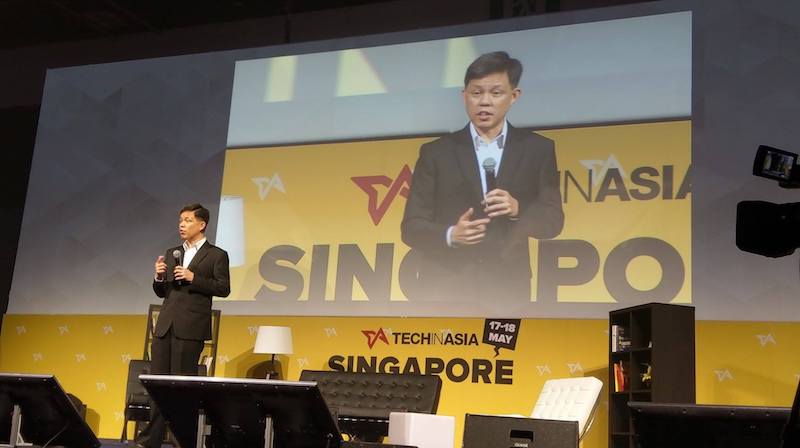“You might be wondering why the first speaker of a startup event is someone from the unions,” quips Chan Chun Sing as he takes the stage of the Tech in Asia 2017 for the opening address.
The response is an unequivocal wave of laughter that ripples through the audience, and all eyes are on him as he makes a disclaimer that “No, NTUC didn’t sponsor this event.”
Secretary-General Chan doesn’t waste anytime jumping into the focus of his address – the 4 competitive advantages Singapore has that we can leverage on, if we want to become a startup capital.
1. Get Our Rules Right
“Our rules are mainly defensive, they prevent bad things from happening […] But if we want to become a startup capital, we have to challenge ourselves to get rules that enable things to get going.”
In Singapore, there is an increasing focus on regulatory sandboxes – rules that allow people to break out of the traditional mould, to experiment and to evolve.
He cites FinTech as an example, where regulatory bodies like MAS (fin) and MCI (tech) need to come together to push the startup ecosystem ahead of everyone else.
“Our rules must be able to manage, and most importantly, enable evolution.”
2. Get The Right Connectivity
In today’s environment, manufacturing of products and ideas are cross-pollinated around the world and industries.
Citing an MIT study about how the United States can’t produce a smartphone by themselves, Secretary-General Chan emphasises how the startup scene can’t work in isolation.
“[The thought] that I can produce a new product in my garage is more myth than real. Most good products on the world stage stem from constant innovation and collaboration.”
3. Get The Right Focus
Here, he speaks jovially about how Singaporeans harbour the mindset that “we will become the next Silicon Valley”. Silicon Valley may be revered as the mecca for entrepreneurship, but that is not what we should become.
“It’s not that we can’t copy, but being a copycat will always make us at best, a second fast learner,” muses Secretary-General Chan. “It will not distinguish us.”
Singaporeans should play to our strengths. One of them is in urban solutions and as per global mega trends, urbanisation is set to continue. These people will need urban solutions in energy, water, health etc and “we have made a virtue [of them] out of necessity here.”
We can also target our brand of trust, he says. “We have a very high trust index with regional players in regulatory, banking and service sectors.”
“These are our strengths, and we should play them up instead of trying to copy others.”
4. Get Our Training Right
“There is no lack in capital or ideas,” he reflects, “but beyond the idea germination stage, the greatest inadequacy is in the availability of trained workers who can carry the startup to the next level.”
Singapore’s conventional education has been very successful, but now we need to “complement that with a continuing education system.”
Conventional education takes too long. After all, 3 months are enough to put a startup in “the dustbin of history”.
The crux is on enabling a new way of learning, to re-imagine education so that people can learn as they grow. “The speed to market of learning has to be in days, at best weeks. But not in terms of months or years.”

We Have The Headstart
“However, we also cannot afford to be complacent,” he stresses. “What we can do, many other countries also want to do, and do it better than us.”
How the Labour Movement and NTUC come into play here is through the close relationships between the government and startups.
“We will be able to adapt as fast as we can, and this is not found in many other countries and cities in the world. [And] if we are able to get the 4 things right, we can build on our vibrant ecosystem to become a startup capital of the world.”
Featured Image Credit: Samantha Tay / Vulcan Post










